Unit 12 Life is full of the unexpected 单元复习课件(共66张PPT)
文档属性
| 名称 | Unit 12 Life is full of the unexpected 单元复习课件(共66张PPT) | 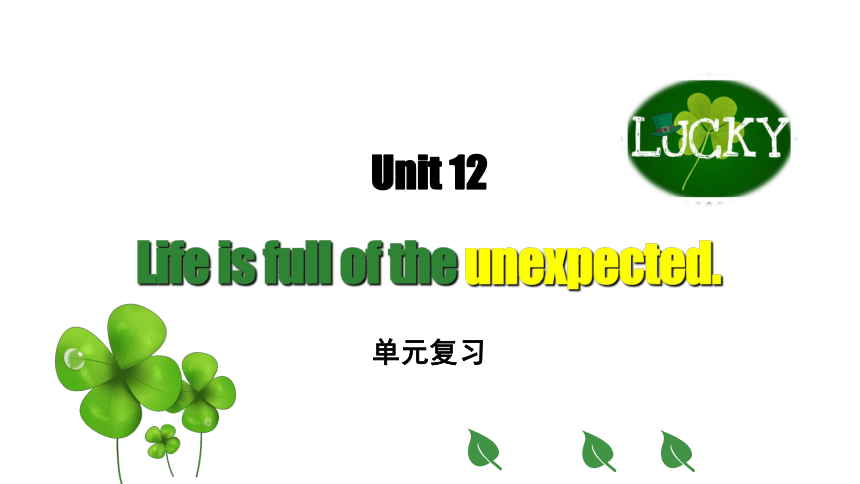 | |
| 格式 | pptx | ||
| 文件大小 | 6.1MB | ||
| 资源类型 | 教案 | ||
| 版本资源 | 人教新目标(Go for it)版 | ||
| 科目 | 英语 | ||
| 更新时间 | 2022-12-28 20:24:03 | ||
图片预览

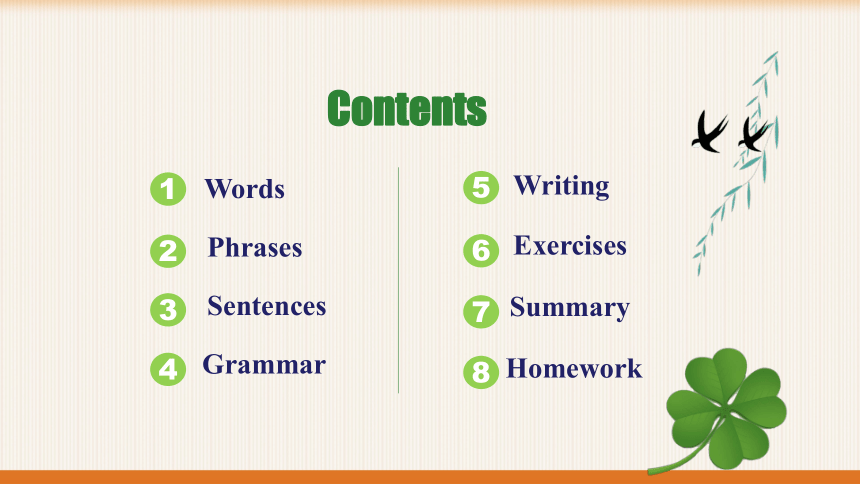
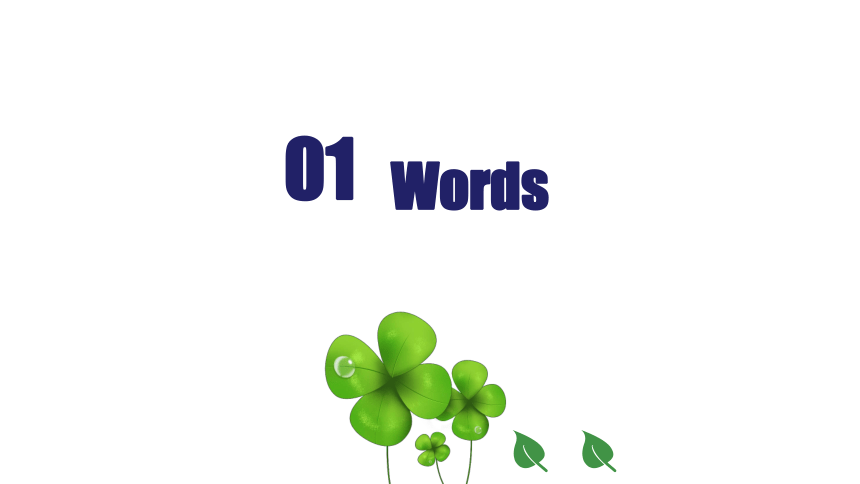
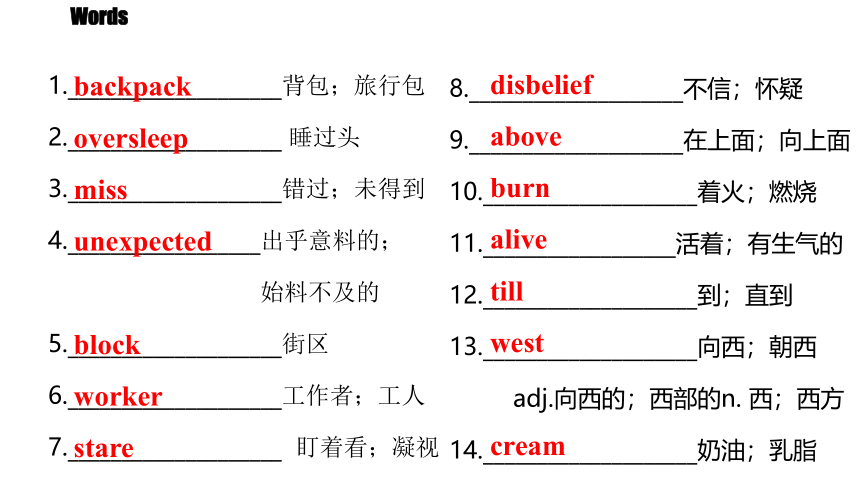
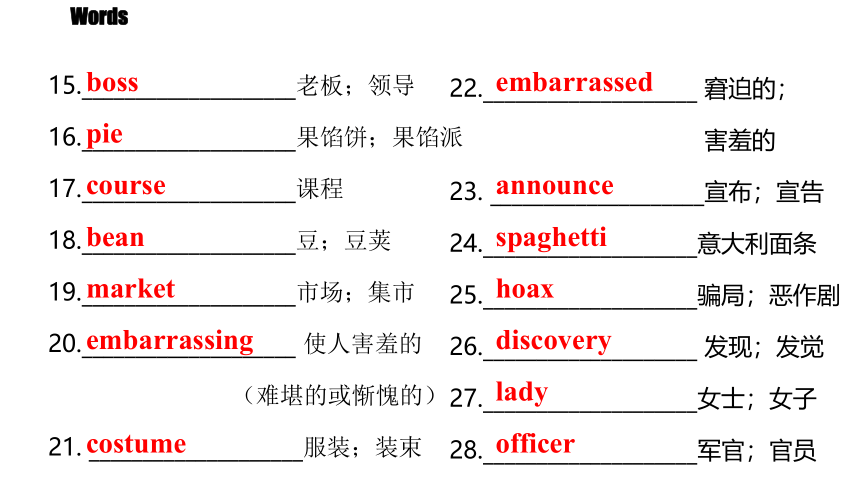
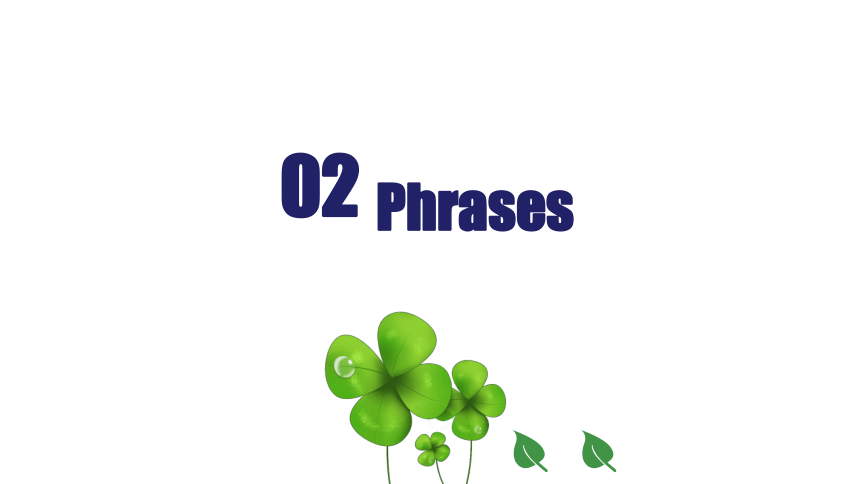
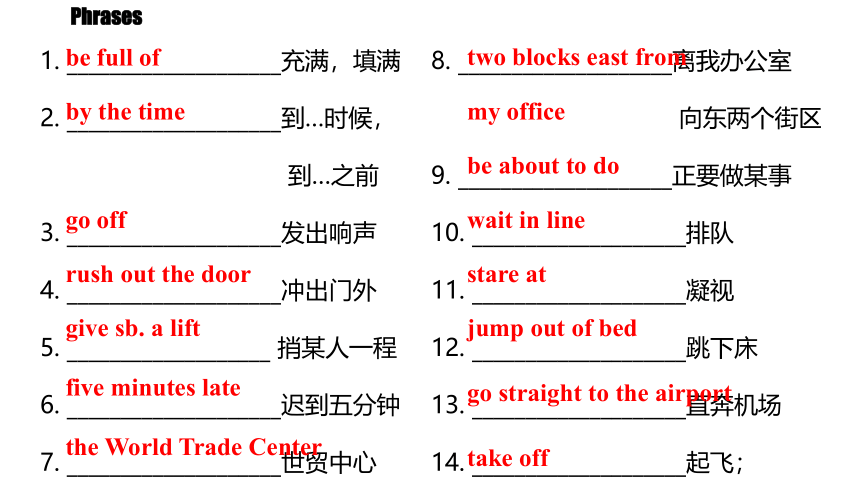
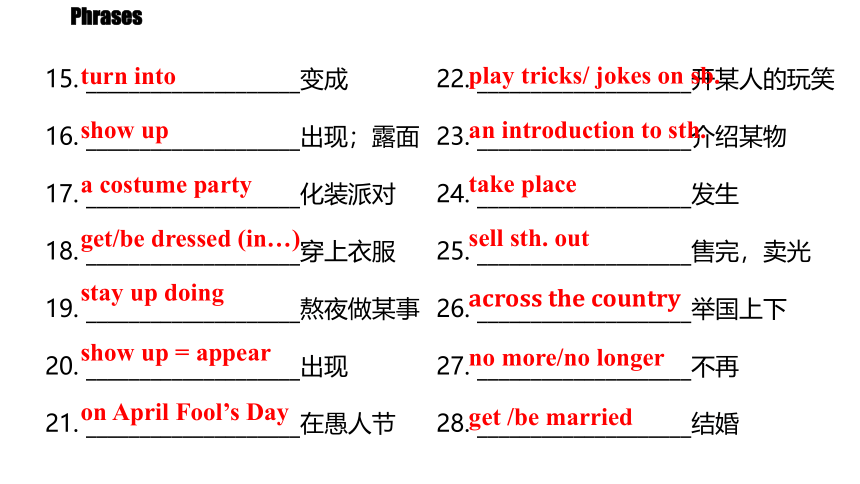
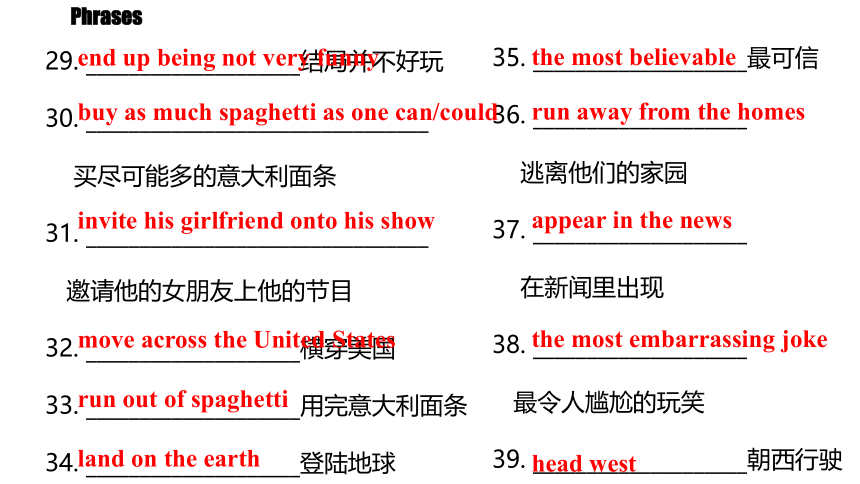
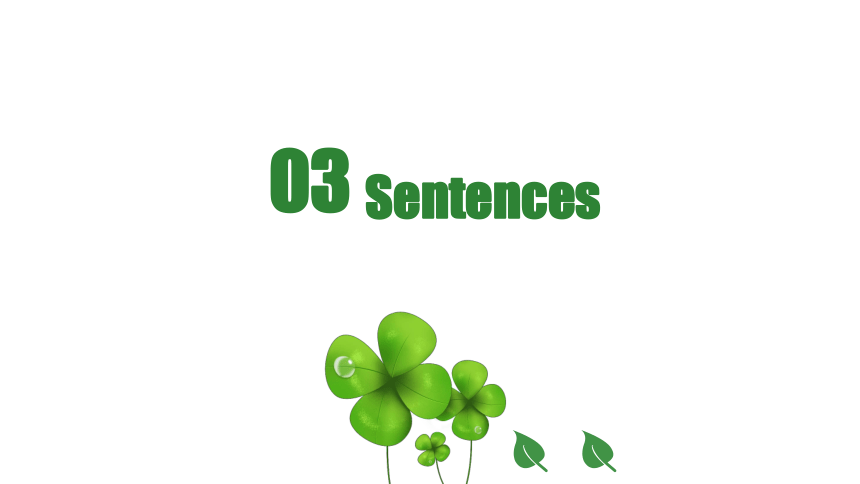
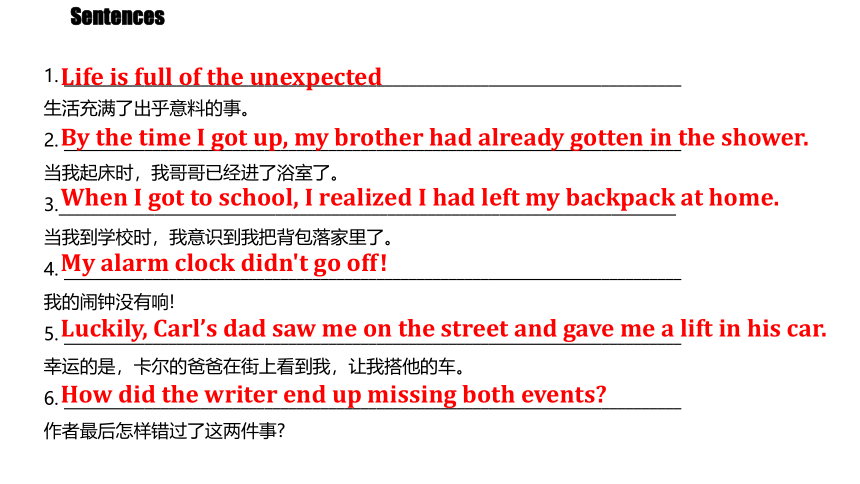
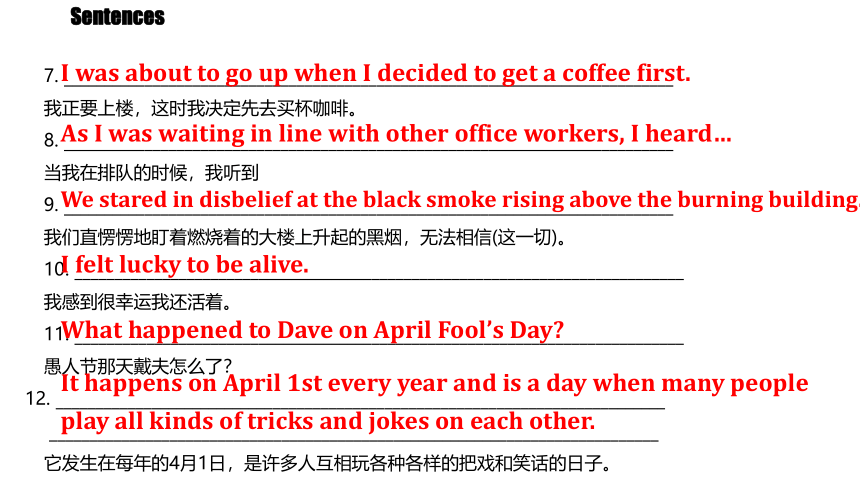
文档简介
(共66张PPT)
单元复习
Unit 12
Life is full of the unexpected.
Contents
Words
1
Sentences
3
Homework
8
Phrases
2
Grammar
4
Exercises
6
Summary
7
Writing
5
Words
01
Words
1.____________________背包;旅行包
2.____________________ 睡过头
3.____________________错过;未得到
4.__________________出乎意料的;
始料不及的
5.____________________街区
6.____________________工作者;工人
7.____________________ 盯着看;凝视
backpack
oversleep
miss
unexpected
block
worker
stare
8.____________________不信;怀疑
9.____________________在上面;向上面
10.____________________着火;燃烧
11.__________________活着;有生气的
12.____________________到;直到
13.____________________向西;朝西
adj.向西的;西部的n. 西;西方
14.____________________奶油;乳脂
disbelief
above
burn
alive
till
west
cream
Words
15.____________________老板;领导
16.____________________果馅饼;果馅派
17.____________________课程
18.____________________豆;豆荚
19.____________________市场;集市
20.____________________ 使人害羞的
(难堪的或惭愧的)
21. ____________________服装;装束
boss
pie
course
bean
market
embarrassing
costume
22.____________________ 窘迫的;
害羞的
23. ____________________宣布;宣告
24.____________________意大利面条
25.____________________骗局;恶作剧
26.____________________ 发现;发觉
27.____________________女士;女子
28.____________________军官;官员
embarrassed
announce
spaghetti
hoax
discovery
lady
officer
Phrases
02
Phrases
1. ____________________充满,填满
2. ____________________到…时候,
到…之前
3. ____________________发出响声
4. ____________________冲出门外
5. ___________________ 捎某人一程
6. ____________________迟到五分钟
7. ____________________世贸中心
8. ____________________离我办公室
向东两个街区
9. ____________________正要做某事
10. ____________________排队
11. ____________________凝视
12. ____________________跳下床
13. ____________________直奔机场
14. ____________________起飞;
be full of
by the time
go off
rush out the door
give sb. a lift
five minutes late
the World Trade Center
two blocks east from
my office
be about to do
wait in line
stare at
jump out of bed
go straight to the airport
take off
Phrases
15. ____________________变成
16. ____________________出现;露面
17. ____________________化装派对
18. ____________________穿上衣服
19. ____________________熬夜做某事
20. ____________________出现
21. ____________________在愚人节
22. ____________________开某人的玩笑
23. ____________________介绍某物
24. ____________________发生
25. ____________________售完,卖光
26. ____________________举国上下
27. ____________________不再
28. ____________________结婚
turn into
show up
a costume party
get/be dressed (in…)
stay up doing
show up = appear
on April Fool’s Day
play tricks/ jokes on sb.
an introduction to sth.
take place
sell sth. out
across the country
no more/no longer
get /be married
Phrases
29. ____________________结局并不好玩
30. ________________________________
买尽可能多的意大利面条
31. ________________________________
邀请他的女朋友上他的节目
32. ____________________横穿美国
33. ____________________用完意大利面条
34. ____________________登陆地球
35. ____________________最可信
36. ____________________
逃离他们的家园
37. ____________________
在新闻里出现
38. ____________________
最令人尴尬的玩笑
39. ____________________朝西行驶
end up being not very funny
buy as much spaghetti as one can/could
invite his girlfriend onto his show
move across the United States
run out of spaghetti
land on the earth
the most believable
run away from the homes
appear in the news
the most embarrassing joke
head west
Sentences
03
Sentences
1. _____________________________________________________________________________
生活充满了出乎意料的事。
2. _____________________________________________________________________________
当我起床时,我哥哥已经进了浴室了。
3._____________________________________________________________________________
当我到学校时,我意识到我把背包落家里了。
4. _____________________________________________________________________________
我的闹钟没有响!
5. _____________________________________________________________________________
幸运的是,卡尔的爸爸在街上看到我,让我搭他的车。
6. _____________________________________________________________________________
作者最后怎样错过了这两件事
Life is full of the unexpected
By the time I got up, my brother had already gotten in the shower.
When I got to school, I realized I had left my backpack at home.
My alarm clock didn't go off!
Luckily, Carl’s dad saw me on the street and gave me a lift in his car.
How did the writer end up missing both events
Sentences
7. ____________________________________________________________________________
我正要上楼,这时我决定先去买杯咖啡。
8. ____________________________________________________________________________
当我在排队的时候,我听到
9. ____________________________________________________________________________
我们直愣愣地盯着燃烧着的大楼上升起的黑烟,无法相信(这一切)。
10. ____________________________________________________________________________
我感到很幸运我还活着。
11. ____________________________________________________________________________
愚人节那天戴夫怎么了?
12. ____________________________________________________________________________
____________________________________________________________________________
它发生在每年的4月1日,是许多人互相玩各种各样的把戏和笑话的日子。
I was about to go up when I decided to get a coffee first.
As I was waiting in line with other office workers, I heard…
We stared in disbelief at the black smoke rising above the burning building.
I felt lucky to be alive.
What happened to Dave on April Fool’s Day
It happens on April 1st every year and is a day when many people
play all kinds of tricks and jokes on each other.
Sentences
13. _____________________________________________________________________________________
_____________________________________________________________________________________
当人们意识到这个故事是一个骗局时,全国所有的意大利面都卖完了。
14. _____________________________________________________________________________________
_____________________________________________________________________________________
另一个著名的恶作剧是一家英国的电视节目报道发现了一种特殊的水。
15. _____________________________________________________________________________________
这位女士很高兴,因为她真的很想结婚。
16. _____________________________________________________________________________________
那个电视明星失去了他的女朋友而且他的节目也被取消了。
17. _____________________________________________________________________________________
威尔斯的故事听起来如此真实,以至于数百人相信了这个故事。
By the time people realized that the story was a hoax, all of the
spaghetti across the country had been sold out.
In another famous trick a TV show in England reported the
discovery of special water.
The lady was so happy because she really wanted to get married.
The TV star lost his girlfriend and his show was canceled.
Welles made it sound so real that hundreds of people believed the story.
Sentences
When I got to school, I realized that I had left my backpack at home.
By the time I got back to school, the bell had rung.
Before I got to the bus stop, the bus had already left.
I was about to go up to my office when I decided to get a coffee first.
As I was waiting in line with the other office workers, I heard a loud sound.
Past Perfect Tense
Grammar
04
含义:
基本结构:
表示在过去某一时间或动作之前已经发生或完成了的动作。
助动词had+V-ed
Grammar Focus
Past Perfect Tense
主句为过去完成时,从句是一般过去时,
主句动作发生在从句之前。
Let’s learn more about it.
过去完成时由“助动词had (用于各种人称和数) + 过去分词”构成
过去的过去
过去某时
现在
将来
过去完成时
从过去之前的某个时间点到过去的某个时间点为止
(先发生)
(后发生)
1. 过去完成时的构成
2. 过去完成时的概念
过去完成时表示某动作或状态在过去某一时间或动作之前已经发生或完成,它表示动作发生的时间是“过去的过去”。
Grammar Focus
3. 过去完成时的句式类型
肯定句:主语+had +过去分词+…
否定句:主语+ hadn’t +过去分词+…
一般疑问句:Had +主语+过去分词…?
(Yes, 主语+had. / No, 主语+hadn’t.)
特殊疑问句:疑问词+had +主语+过去分词+…?
Grammar Focus
1. 由时间状语来判定
(1) by + 过去的时间点。
I had finished reading the novel by nine o'clock last night.
昨天晚上九点前我已经读完这本小说了。
(2) by the end of + 过去的时间点。
到...为止
(3) before + 过去的时间点。
在...之前
过去的过去,先发生
4. 过去完成时的判断依据
Grammar Focus
(1) 宾语从句中: 当宾语从句的主句为一般过去时,且从句的动作先于主句的动作时,从句要用过去完成时。在told, said, knew, heard, thought等动词后的宾语从句中。
如:
She said that she had seen the film before.
她说她以前看过这电影。
看电影是在她说之前做的。
4. 过去完成时的判断依据
Grammar Focus
2. 由“过去的过去”判定
(2) 状语从句 : 在时间、条件、 原因、 方式等状语从句中,
主、从句的动作发生有先后关系,动作在前的,要用过去完成时,动作在后的要用一般过去时。
如:
When I got to the station, the train had already left.
当我到达车站时,火车已经离开了。
2. 由“过去的过去”判定
火车离开发生在我到达车站之前。
4. 过去完成时的判断依据
Grammar Focus
注意:before, after 引导的时间状语从句中,由于 before 和 after 本身已表达了动作的先后关系,若主、从句表示的动作紧接着发生,则主、从句都用一般过去时。
如:
After he closed the door, he left the classroom.
他关上门,离开了教室。
4. 过去完成时的判断依据
Grammar Focus
2. 由“过去的过去”判定
5. 过去完成时与一般过去时的区别
过去完成时:强调“过去的过去”;
一般过去时:强调过去某一特定的时间。
①They had arrived at the station by ten yesterday.
他们昨天十点前就到车站了。
②They arrived at the station at ten yesterday.
他们昨天十点到了车站。
1. 时间状语不同
Grammar Focus
2. 在过去的时间中,哪个先发生,哪个后发生。
在没有明确的过去时间状语作标志时,谓语动词动作发生的时间先后须依据上下文来判断:
先发生的用过去完成时,后发生的则用一般过去时。
She was very happy. Her whole family were pleased with her, too. She had just won the first in the composition competition.
5. 过去完成时与一般过去时的区别
Grammar Focus
时态 概念 常见的时间状语 例句
一般过去时 在过去某个时间发生的动作或存在的状态。 yesterday, last week, ago, just now等 The film started ten minutes ago.
现在完成时 过去发生或已经发生的动作对现在造成的影响。 just, never, ever, so far, already, since, for等 The film has already started.
过去完成时 在过去某个时间或动作之前就已发生的动作,即表示动作发生的时间是“过去的过去”。 by the time+从句;by the end of last+时间段; before+过去时间状语等 By the time they arrived at the cinema, the film had started.
过去完成时与一般过去时、现在完成时的用法区别
Grammar Focus
现在完成时
此处的情境强调“离开”的动作对现在的影响:公交车已经离开,现在已不在公交车站,故用现在完成时。
The bus has already left.
过去完成时
此处的情境强调“我到达车站时,公交车已经离开”,即表示“公交离开”的动作发生在“到达车站”之前,即“过去的过去”,故用过去完成时。
When I got to the bus stop, the bus had already left.
一般过去时
此处的情境强调“公交离开”的动作是五分钟前发生的,故用一般过去时。
The bus left five minutes ago.
Grammar Focus
Grammar Focus
When I got to school, I realized that I had left my backpack at home.
By the time I got back to school, the bell had rung.
Before I got to the bus stop, the bus had already left.
I was about to go up to my office when I decided to get a coffee first.
As I was waiting in line with the other office workers, I heard a loud sound.
表示即将发生的动作
1. was about to do是什么意思?
2. was about to do ... when ...是什么意思?
be about to do, be doing等表示即将或正在做某事时,常用when引导从句表示突然发生的动作。
用法:表示即将发生的动作,在时间上指最近的将来。
We are about to finish our homework.
注意:在含有be about to do的句子中,不能再加时间状语。
Wrong: The medical team is about to start right now.
Right: The medical team is about to start.
Grammar Focus
be about to do sth.
拓展:be going to do sth.
It is going to rain soon. 快要下雨了。
He's going to buy a car.他打算买一辆车 (有这方面的计划,最后买不买不知道)。
1) 表示将要发生的事情或打算要进行的动作。
The football match will be put off if it rains tomorrow.
2) 在含有条件状语从句的主从复合句中,主句一般不用be going to,而常用will(第一人称用shall)。
Grammar Focus
be going to do sth
1. Life is full of the unexpected.
unexpected adj. 出乎意料的;始料不及的
e.g. It will not be unexpected if Tom comes late again, because he is always like this.
如果汤姆又迟到了,一点也不意外,因为他一向如此。
Life is full of the unexpected.
“the + 形容词”表示一类人或物
Language points
by the time 在……以前,常引导表示过去的时间状语从句,
主句常用过去完成时,即had + 动词过去分词。
e.g. By the time I got there, he had already left.
在我到那儿之前,他已经离开了。
Language points
2. By the time I got up, my brother had already gotten in the shower.
3. When I got home, I realized I had left my keys in the backpack.
leave v. 忘了带;丢下
I left my bag on the bus.
Don’t leave the child by himself at home.
leave+宾语+地点状语 把······忘在某地
leave sb. by oneself 把某人单独留下
leave
【易混辨析】leave与forget
两词都可以表示“遗忘”的意思,其区别如下:
Sorry, I forgot my English book. I left it at home.
leave 通常与地点状语连用,表示将某物遗忘在某地。
forget 不与地点状语连用,表示忘记带某物。
Language points
4. So I just quickly put on some clothes...
put on 穿上
Please put on warm clothes when it’s cold.
You’d better put it on when you go out.
put on是动副短语,强调动作,反义短语是take off。其宾语若是代词,代词要放在put与on中间。
【拓展】put on的其他用法:
(1)增加(体重);发胖
Jenny put on 3 kilos during the Spring Festival.
(2)上演;举办
They sold their second-hand books, put on talent shows and asked for donations, even going door-to-door for them.
Language points
一、作介词 prep
在...上面 The moon is now above the trees.月亮正位于树梢上。
在...之上,超过 They are children above six years old.他们是六岁以上的孩子。
高于;优于;胜过In the company, Dick ranks above Tom.在公司里,迪克地位比汤姆高。
不屑于;不致于He considered himself above doing such things.他自认为是不会去做
那种事的。
Language points
5. above
二、作副词
1.在上面;向上面 There are snowy peaks above.上面是白雪皑皑的群峰。
2. (级别、数目等)更高;更大;更多
Men and women of eighteen and above are eligible to vote.
年龄在十八岁以上的男女有投票表决权。
3. 在上文 See the examples given above.见上述例子。
三、作名词——上文;上述事实
In addition to all of the above, she won a Prize in 1980. 除上述外,她还在1980年获奖。
辨析above 、on 、over
Language points
5. above
above的意思是“在…之上”,“高于…”,表示相对高度,不一定是在正上方,它的反义词是below.
The plane flew above the clouds.飞机在云层上面飞行。
2. over的意思是“在…之上”,表示在垂直之上,其反义词是under.
例:There is a bridge over the river. 河上有座桥。
There is a boat under the bridge. 桥下有一只船。
3.on的意思是“在…上面”,表示与表面接触。
例: He put the book on the desk.他把书放在课桌上。
6.辨析alive, living ,live, lively
辨
析
alive 主要用作表语(有时可作后置定语,但不作前置定语),可用于人或动物。
如:He must be still alive. 他一定还活着。
注:若 alive 本身有修饰语,则也可用作前置定语。
如:He is a really alive student.
他的确是一个十分活跃的学生。
living 可用作表语或定语,可用于人或物。
如:Are your grandparents still living?
你的祖父母还健在吗?
living
alive
live
v.生存,活着;adj.活的,有生命的;adv.现场直播地
This is live fish. 这是一条活鱼。
live
意为“生动的;活泼的",通常用来描述人及其行为或活动,可以作定语或表语
Jenny is a lively girl. 詹妮是个活泼的女孩。
lively
n.蠢人;傻瓜 v.愚弄
fool的形容词是foolish,意为“愚蠢的”。
April Fool’s Day意为“愚人节”,时间是4月1日。
考点 tell
fool
7. fool
He was fooled by his friend on April Fool’s Day.
He is a fool. He doesn’t know what to do.
Language Points
与fool 有关的短语:
make a fool of sb. 愚弄某人;
play the fool 装傻,扮丑相(以逗人笑,但往往惹人恼怒);
fool sb. into doing sth.欺骗某人干某事。
adj.窘迫的;害羞的
embarrassed常用来修饰人,
embarrassing常用来修饰事或物。
考点 tell
embarrassed
8. embarrassed
He was embarrassed in the embarrassing situation.
Language Points
【拓展】同根词:
embarrass v. 使局促不安;使困窘
embarrassment n.窘迫;难堪
embarrassing adj. 使人害羞的(难堪的或愧疚的)
That was an embarrassing situation for me.
get dressed动词短语,意为“穿衣服”,
相当于be dressed。若后面有表示“衣服/颜色”
的名词做宾语时,需用介词in,
即get/be dressed in+表示“衣服/颜色”的词。
考点 tell
get dressed
9. I got up, took a shower, got dressed, and went to school.
Go and get dressed.
Language Points
【拓展】get dressed与be dressed (in)
get dressed
be dressed (in)
表示“穿”的动作
表示“穿”的状态
He’s getting dressed.
He’s dressed in grey.
other 其余的
考点 tell
other
1
10. The other kids showed up.
Look at the twins. One is thin, the other is heavy.
Language Points
【拓展】 the other, another, other, others, the others
the other 特指两者中的另一个。one... the other... 一个……另一个……
another 泛指三者或三者以上中的另一个,后接单数名词。
other 泛指别的;其他的。后常接复数名词或不可数名词。
others 泛指其他的人或物, 后不接名词。some... others... 一些……另一些……
the others 特指某一范围内的另外的人或物。some... the others... 一些……其余的……
show up 露面,到场;(使)看得见
考点 tell
show up
2
10. The other kids showed up.
We waited until five o’clock, but he did not show up.
Language Points
that takes place in different countries around the world
是由关系代词that引导的定语从句,
修饰前面的先行词a celebration。
考点 tell
that
1
11. April Fool’s Day is a celebration that takes place in different countries around the world.
He is the right person that can bring you new thought and passion.
Language Points
She is the only person that solves this math problem.
take place
意为“发生;进行;举行;产生”。
考点 tell
take place
2
11. April Fool’s Day is a celebration that takes place in different countries around the world.
Great changes have taken place in my hometown.
Language Points
Elections take place every year.
when many people play all kinds of tricks and jokes
on each other是由关系副词when引导的定语从句,
修饰表示时间的先行词 a day。
考点 tell
when
1
12. It happens on April 1st every year and is a day when many people play all kinds of tricks and jokes on each other.
I will always remember the days when I lived with my grandparents
in the country.
Language Points
This was the time when she left for Beijing.
考点 tell
happen
2
12. It happens on April 1st every year and is a day when many people play all kinds of tricks and jokes on each other.
Language Points
happen
用
法
1.What happened 发生什么事了?
happen 一定用过去式,且不用被动语态。
3. sth. + happen to +sb.意为“某人发生了某事”。
A car accident happened to Jim yesterday.
昨天吉姆发生了交通事故。
2. sth. + happen +时间/地点,意为“某时/某地发生了某事”。
An accident happened in our neighborhood just now.
刚才我们社区发生了一起事故。
4. sb. + happen to do sth.意为“某人碰巧做某事”。
I happened to hear that interesting story.
我碰巧听说了那个有趣的故事。
考点 tell
happen
2
12. It happens on April 1st every year and is a day when many people play all kinds of tricks and jokes on each other.
The sports meeting will take place in our school.
Language Points
I happened to be in the lab that day.
take place 通常指事先计划或预料到的事情发生,
还可表示“举行”的意思。
happen 常指具体的事情发生,特指那些偶然或
出乎意料发生的事情,
后接不定式,表示“碰巧;恰好”之意。
play tricks on sb. 意为“捉弄某人”,
而play jokes on sb.则是“对某人开玩笑 ”的意思。
考点 tell
play tricks/ jokes on sb.
3
12. It happens on April 1st every year and is a day when many people play all kinds of tricks and jokes on each other.
It's impolite to laugh at, stare at or play tricks on disabled people.
Language Points
as +形容词/副词的原级+ as sb. can / could
相当于as + 形容词/副词原级+ as possible,
意为“尽可能地……”,在句中作状语。
考点 tell
as …as
13. Many people ran to their local supermarkets
to buy as much spaghetti as they could.
We must do everything as well as we can.
Language Points
We must do everything as well as possible.
marry sb. 意为“嫁/娶某人”。
get married to sb. 意为“嫁/娶某人;与某人结婚”,为短暂性词组。
be married to sb. 意为“嫁/娶某人;与某人结婚”,是延续性词组。
考点 tell
marry
14.He asked her to marry him.
She married John last year.
Language Points
= She got married to John last year.
= She has been married to John for one year.
end up (doing sth.)(以…)结束; 最终成为; 最后处于
end up sth. 表示“结束某事”
end up with sth. (以…)结束
考点 tell
end up
15. Many April Fool’s jokes may end up being not very funny.
They decided to drive to York and ended up getting lost.
Language Points
The scientist ended up his speech at last.
This play end up with happy ending.
Writing
05
Writing
假如你是李梅,请根据下面的内容提示,给你的笔友戴维(David)写一封信,向他倾诉你的烦恼。
内容提示:
你现在很担心昨天的英语考试。
因为昨天早晨你睡过头,考试迟到了。
又因为时间紧张,做题过程中犯了不少错误,
更糟糕的是没能完全理解书面表达的主题,
所以你担心自己不能通过这次考试。
词数要求:
80~100,信的开头和结尾已给出,不计入总词数。
题干解读:
题目要求以李梅的身份给笔友戴维(David)写一封信,向他倾诉自己的烦恼的原因。注意,写作时要根据题目所给的内容提示。
写作指导:
因为文中是对过去事情的叙述,故时态上以一般过去时为主。根据内容提示,把自己的烦恼的原因倾诉给笔友(David),另外,为了句子连贯、上下文联系紧密,可适当发挥,增加些连接词。
导语
Dear David,
We had an English exam yesterday. Now I feel very worried because I don’t think I did well in it.
First, I arrived late for the exam because I overslept in the morning. When I got to the classroom, the exam had been on for half an hour. So I hurried to do the exam. After the exam I realized that I had made a lot of mistakes in it. Terribly, I was unable to fully understand the writing part.
Now I’m very afraid I couldn’t pass the exam. I’m really upset.
Yours,
Li Mei
总结感慨
开篇点题
以第一人称为主, 时态用一般过去时和过去完成时
连接词
Exercises
06
1. The government ____ a school for the homeless people to stay for the night.
A. took up B. set up C. got up D. picked up
2. Bob is taking the desks away because they ______ too much room.
A. stand up B. pick up C. take up D. listen up
3. ______! It’s not the end of the world. Let’s try again.
Put up B. Set up C. Cheer up D. Pick up
4. —Mary is about to Hong Kong this month.
—I think this will give her a new ______ in her life.
A. start B. end C. style D. look
单项选择。
5. The movie ____ been on for five minutes by the time I arrived at the cinema.
A. is B. was C. have D. had
6. We looked up and saw some birds flying ______ the mountains.
on B. above C. under D. below
7. —Sorry, Mr. Green. I have ______ my homework at home.
—Never mind. But don’t forget ______ it to school tomorrow.
A. left; bringing B. forget; to bring
C. left; to bring D. forgot; bringing
单项选择。
8. The street is ______ of people.
A. full B. fill C. filled D. fulled
9. Mary, hurry up! Or ______ we get there, the performance have been over.
at the time B. on time C. by the time D. in time
10. The train from Beijing ______ ten minutes ago.
has arrived B. was arriving C. arrived D. had arrived
12. The students ______ their classroom before the visitors arrived.
A. have cleaned B. had cleaned C. was cleaned D. cleaned
单项选择。
13. When we arrived there, they ______ the work.
A. has completed B. completed C. will complete D. had completed
14. I didn’t go to the cinema with my friends because I ______ that movie twice.
A. have watched B. had watched C. was watching D. would watch
15. By the end of last month, I ______ all the CDs of Justin Bieber.
A. collect B. collected C. have collected D. had collected
单项选择。
16. What you said makes me feel ______.
A. embarrassed B. embarrassing
C. to be embarrassed D. being embarrassed
17. The Great Green Wall can stop the wind and sand ______ to the rich land in the north of China.
move B. to move C. from moving D. to moving
18. Sam is ______ a clever boy ______ he can answer all the questions.
A. too; to B. so; that C. such; that D. either; or
单项选择。
19.—Have you ever ______ an amusement park
—Yes, I have. I ______ the Ocean Park last month.
A. been to; have gone to B. gone to; have been to
C. go to; went to D. been to; went to
20. Sally enjoys collecting. She has collected ______ coins.
hundreds B. hundred
C. hundreds of D. hundred of
单项选择。
Summary
07
Summary
Unit 12
Unexpected events
Functions
能讲述过去发生的事情(Narrate past events)
When I woke up, it was already 8:00 a.m.
Before l got to the bus stop, the bus had already left.
By the time I got to the airport, my plane to New Zealand had already taken off.
Grammar
1. 了解过去完成时(Past perfect tense)
2. 语法复习(Review of key structures)
能正确使用由when, before, as, by the time引导的时间状语从句表达过去发生的事情
When I got to school, I realized that I had left my backpack at home.
By the time I got back to school, the bell had rung.
Before I got to the bus stop, the bus had already left.
As I was waiting in line with the other office workers, I heard a loud sound.
Words & expressions
1. 能正确使用以下词汇(Curriculum words)
backpack, block, worker, airport, cream, pie, bean, market, fool, discovery, lady, officer, oversleep, ring, burn, cancel, disappear, unexpected, alive, believable, above, till, west
2. 能正确使用以下常用表达(Useful expressions)
by the time, give…a lift, in line with, show up, by the end of, costume party, sell out
3. 能认读下列词汇(Non-curriculum words)
stare, disbelief, burning, workday, costume, embarrassed, announce, spaghetti, hoax, embarrassing, New Zealand, Italy, Mars
Strategies
1. 利用本单元听力图片信息,预测听力内容
2. 根据语篇中的段落首句,激活相关背景知识,
预测文章内容
Culture
了解国外愚人节风俗
Homework
08
Grammar Focus
Homework
Review Unit 12.
See you.
单元复习
Unit 12
Life is full of the unexpected.
Contents
Words
1
Sentences
3
Homework
8
Phrases
2
Grammar
4
Exercises
6
Summary
7
Writing
5
Words
01
Words
1.____________________背包;旅行包
2.____________________ 睡过头
3.____________________错过;未得到
4.__________________出乎意料的;
始料不及的
5.____________________街区
6.____________________工作者;工人
7.____________________ 盯着看;凝视
backpack
oversleep
miss
unexpected
block
worker
stare
8.____________________不信;怀疑
9.____________________在上面;向上面
10.____________________着火;燃烧
11.__________________活着;有生气的
12.____________________到;直到
13.____________________向西;朝西
adj.向西的;西部的n. 西;西方
14.____________________奶油;乳脂
disbelief
above
burn
alive
till
west
cream
Words
15.____________________老板;领导
16.____________________果馅饼;果馅派
17.____________________课程
18.____________________豆;豆荚
19.____________________市场;集市
20.____________________ 使人害羞的
(难堪的或惭愧的)
21. ____________________服装;装束
boss
pie
course
bean
market
embarrassing
costume
22.____________________ 窘迫的;
害羞的
23. ____________________宣布;宣告
24.____________________意大利面条
25.____________________骗局;恶作剧
26.____________________ 发现;发觉
27.____________________女士;女子
28.____________________军官;官员
embarrassed
announce
spaghetti
hoax
discovery
lady
officer
Phrases
02
Phrases
1. ____________________充满,填满
2. ____________________到…时候,
到…之前
3. ____________________发出响声
4. ____________________冲出门外
5. ___________________ 捎某人一程
6. ____________________迟到五分钟
7. ____________________世贸中心
8. ____________________离我办公室
向东两个街区
9. ____________________正要做某事
10. ____________________排队
11. ____________________凝视
12. ____________________跳下床
13. ____________________直奔机场
14. ____________________起飞;
be full of
by the time
go off
rush out the door
give sb. a lift
five minutes late
the World Trade Center
two blocks east from
my office
be about to do
wait in line
stare at
jump out of bed
go straight to the airport
take off
Phrases
15. ____________________变成
16. ____________________出现;露面
17. ____________________化装派对
18. ____________________穿上衣服
19. ____________________熬夜做某事
20. ____________________出现
21. ____________________在愚人节
22. ____________________开某人的玩笑
23. ____________________介绍某物
24. ____________________发生
25. ____________________售完,卖光
26. ____________________举国上下
27. ____________________不再
28. ____________________结婚
turn into
show up
a costume party
get/be dressed (in…)
stay up doing
show up = appear
on April Fool’s Day
play tricks/ jokes on sb.
an introduction to sth.
take place
sell sth. out
across the country
no more/no longer
get /be married
Phrases
29. ____________________结局并不好玩
30. ________________________________
买尽可能多的意大利面条
31. ________________________________
邀请他的女朋友上他的节目
32. ____________________横穿美国
33. ____________________用完意大利面条
34. ____________________登陆地球
35. ____________________最可信
36. ____________________
逃离他们的家园
37. ____________________
在新闻里出现
38. ____________________
最令人尴尬的玩笑
39. ____________________朝西行驶
end up being not very funny
buy as much spaghetti as one can/could
invite his girlfriend onto his show
move across the United States
run out of spaghetti
land on the earth
the most believable
run away from the homes
appear in the news
the most embarrassing joke
head west
Sentences
03
Sentences
1. _____________________________________________________________________________
生活充满了出乎意料的事。
2. _____________________________________________________________________________
当我起床时,我哥哥已经进了浴室了。
3._____________________________________________________________________________
当我到学校时,我意识到我把背包落家里了。
4. _____________________________________________________________________________
我的闹钟没有响!
5. _____________________________________________________________________________
幸运的是,卡尔的爸爸在街上看到我,让我搭他的车。
6. _____________________________________________________________________________
作者最后怎样错过了这两件事
Life is full of the unexpected
By the time I got up, my brother had already gotten in the shower.
When I got to school, I realized I had left my backpack at home.
My alarm clock didn't go off!
Luckily, Carl’s dad saw me on the street and gave me a lift in his car.
How did the writer end up missing both events
Sentences
7. ____________________________________________________________________________
我正要上楼,这时我决定先去买杯咖啡。
8. ____________________________________________________________________________
当我在排队的时候,我听到
9. ____________________________________________________________________________
我们直愣愣地盯着燃烧着的大楼上升起的黑烟,无法相信(这一切)。
10. ____________________________________________________________________________
我感到很幸运我还活着。
11. ____________________________________________________________________________
愚人节那天戴夫怎么了?
12. ____________________________________________________________________________
____________________________________________________________________________
它发生在每年的4月1日,是许多人互相玩各种各样的把戏和笑话的日子。
I was about to go up when I decided to get a coffee first.
As I was waiting in line with other office workers, I heard…
We stared in disbelief at the black smoke rising above the burning building.
I felt lucky to be alive.
What happened to Dave on April Fool’s Day
It happens on April 1st every year and is a day when many people
play all kinds of tricks and jokes on each other.
Sentences
13. _____________________________________________________________________________________
_____________________________________________________________________________________
当人们意识到这个故事是一个骗局时,全国所有的意大利面都卖完了。
14. _____________________________________________________________________________________
_____________________________________________________________________________________
另一个著名的恶作剧是一家英国的电视节目报道发现了一种特殊的水。
15. _____________________________________________________________________________________
这位女士很高兴,因为她真的很想结婚。
16. _____________________________________________________________________________________
那个电视明星失去了他的女朋友而且他的节目也被取消了。
17. _____________________________________________________________________________________
威尔斯的故事听起来如此真实,以至于数百人相信了这个故事。
By the time people realized that the story was a hoax, all of the
spaghetti across the country had been sold out.
In another famous trick a TV show in England reported the
discovery of special water.
The lady was so happy because she really wanted to get married.
The TV star lost his girlfriend and his show was canceled.
Welles made it sound so real that hundreds of people believed the story.
Sentences
When I got to school, I realized that I had left my backpack at home.
By the time I got back to school, the bell had rung.
Before I got to the bus stop, the bus had already left.
I was about to go up to my office when I decided to get a coffee first.
As I was waiting in line with the other office workers, I heard a loud sound.
Past Perfect Tense
Grammar
04
含义:
基本结构:
表示在过去某一时间或动作之前已经发生或完成了的动作。
助动词had+V-ed
Grammar Focus
Past Perfect Tense
主句为过去完成时,从句是一般过去时,
主句动作发生在从句之前。
Let’s learn more about it.
过去完成时由“助动词had (用于各种人称和数) + 过去分词”构成
过去的过去
过去某时
现在
将来
过去完成时
从过去之前的某个时间点到过去的某个时间点为止
(先发生)
(后发生)
1. 过去完成时的构成
2. 过去完成时的概念
过去完成时表示某动作或状态在过去某一时间或动作之前已经发生或完成,它表示动作发生的时间是“过去的过去”。
Grammar Focus
3. 过去完成时的句式类型
肯定句:主语+had +过去分词+…
否定句:主语+ hadn’t +过去分词+…
一般疑问句:Had +主语+过去分词…?
(Yes, 主语+had. / No, 主语+hadn’t.)
特殊疑问句:疑问词+had +主语+过去分词+…?
Grammar Focus
1. 由时间状语来判定
(1) by + 过去的时间点。
I had finished reading the novel by nine o'clock last night.
昨天晚上九点前我已经读完这本小说了。
(2) by the end of + 过去的时间点。
到...为止
(3) before + 过去的时间点。
在...之前
过去的过去,先发生
4. 过去完成时的判断依据
Grammar Focus
(1) 宾语从句中: 当宾语从句的主句为一般过去时,且从句的动作先于主句的动作时,从句要用过去完成时。在told, said, knew, heard, thought等动词后的宾语从句中。
如:
She said that she had seen the film before.
她说她以前看过这电影。
看电影是在她说之前做的。
4. 过去完成时的判断依据
Grammar Focus
2. 由“过去的过去”判定
(2) 状语从句 : 在时间、条件、 原因、 方式等状语从句中,
主、从句的动作发生有先后关系,动作在前的,要用过去完成时,动作在后的要用一般过去时。
如:
When I got to the station, the train had already left.
当我到达车站时,火车已经离开了。
2. 由“过去的过去”判定
火车离开发生在我到达车站之前。
4. 过去完成时的判断依据
Grammar Focus
注意:before, after 引导的时间状语从句中,由于 before 和 after 本身已表达了动作的先后关系,若主、从句表示的动作紧接着发生,则主、从句都用一般过去时。
如:
After he closed the door, he left the classroom.
他关上门,离开了教室。
4. 过去完成时的判断依据
Grammar Focus
2. 由“过去的过去”判定
5. 过去完成时与一般过去时的区别
过去完成时:强调“过去的过去”;
一般过去时:强调过去某一特定的时间。
①They had arrived at the station by ten yesterday.
他们昨天十点前就到车站了。
②They arrived at the station at ten yesterday.
他们昨天十点到了车站。
1. 时间状语不同
Grammar Focus
2. 在过去的时间中,哪个先发生,哪个后发生。
在没有明确的过去时间状语作标志时,谓语动词动作发生的时间先后须依据上下文来判断:
先发生的用过去完成时,后发生的则用一般过去时。
She was very happy. Her whole family were pleased with her, too. She had just won the first in the composition competition.
5. 过去完成时与一般过去时的区别
Grammar Focus
时态 概念 常见的时间状语 例句
一般过去时 在过去某个时间发生的动作或存在的状态。 yesterday, last week, ago, just now等 The film started ten minutes ago.
现在完成时 过去发生或已经发生的动作对现在造成的影响。 just, never, ever, so far, already, since, for等 The film has already started.
过去完成时 在过去某个时间或动作之前就已发生的动作,即表示动作发生的时间是“过去的过去”。 by the time+从句;by the end of last+时间段; before+过去时间状语等 By the time they arrived at the cinema, the film had started.
过去完成时与一般过去时、现在完成时的用法区别
Grammar Focus
现在完成时
此处的情境强调“离开”的动作对现在的影响:公交车已经离开,现在已不在公交车站,故用现在完成时。
The bus has already left.
过去完成时
此处的情境强调“我到达车站时,公交车已经离开”,即表示“公交离开”的动作发生在“到达车站”之前,即“过去的过去”,故用过去完成时。
When I got to the bus stop, the bus had already left.
一般过去时
此处的情境强调“公交离开”的动作是五分钟前发生的,故用一般过去时。
The bus left five minutes ago.
Grammar Focus
Grammar Focus
When I got to school, I realized that I had left my backpack at home.
By the time I got back to school, the bell had rung.
Before I got to the bus stop, the bus had already left.
I was about to go up to my office when I decided to get a coffee first.
As I was waiting in line with the other office workers, I heard a loud sound.
表示即将发生的动作
1. was about to do是什么意思?
2. was about to do ... when ...是什么意思?
be about to do, be doing等表示即将或正在做某事时,常用when引导从句表示突然发生的动作。
用法:表示即将发生的动作,在时间上指最近的将来。
We are about to finish our homework.
注意:在含有be about to do的句子中,不能再加时间状语。
Wrong: The medical team is about to start right now.
Right: The medical team is about to start.
Grammar Focus
be about to do sth.
拓展:be going to do sth.
It is going to rain soon. 快要下雨了。
He's going to buy a car.他打算买一辆车 (有这方面的计划,最后买不买不知道)。
1) 表示将要发生的事情或打算要进行的动作。
The football match will be put off if it rains tomorrow.
2) 在含有条件状语从句的主从复合句中,主句一般不用be going to,而常用will(第一人称用shall)。
Grammar Focus
be going to do sth
1. Life is full of the unexpected.
unexpected adj. 出乎意料的;始料不及的
e.g. It will not be unexpected if Tom comes late again, because he is always like this.
如果汤姆又迟到了,一点也不意外,因为他一向如此。
Life is full of the unexpected.
“the + 形容词”表示一类人或物
Language points
by the time 在……以前,常引导表示过去的时间状语从句,
主句常用过去完成时,即had + 动词过去分词。
e.g. By the time I got there, he had already left.
在我到那儿之前,他已经离开了。
Language points
2. By the time I got up, my brother had already gotten in the shower.
3. When I got home, I realized I had left my keys in the backpack.
leave v. 忘了带;丢下
I left my bag on the bus.
Don’t leave the child by himself at home.
leave+宾语+地点状语 把······忘在某地
leave sb. by oneself 把某人单独留下
leave
【易混辨析】leave与forget
两词都可以表示“遗忘”的意思,其区别如下:
Sorry, I forgot my English book. I left it at home.
leave 通常与地点状语连用,表示将某物遗忘在某地。
forget 不与地点状语连用,表示忘记带某物。
Language points
4. So I just quickly put on some clothes...
put on 穿上
Please put on warm clothes when it’s cold.
You’d better put it on when you go out.
put on是动副短语,强调动作,反义短语是take off。其宾语若是代词,代词要放在put与on中间。
【拓展】put on的其他用法:
(1)增加(体重);发胖
Jenny put on 3 kilos during the Spring Festival.
(2)上演;举办
They sold their second-hand books, put on talent shows and asked for donations, even going door-to-door for them.
Language points
一、作介词 prep
在...上面 The moon is now above the trees.月亮正位于树梢上。
在...之上,超过 They are children above six years old.他们是六岁以上的孩子。
高于;优于;胜过In the company, Dick ranks above Tom.在公司里,迪克地位比汤姆高。
不屑于;不致于He considered himself above doing such things.他自认为是不会去做
那种事的。
Language points
5. above
二、作副词
1.在上面;向上面 There are snowy peaks above.上面是白雪皑皑的群峰。
2. (级别、数目等)更高;更大;更多
Men and women of eighteen and above are eligible to vote.
年龄在十八岁以上的男女有投票表决权。
3. 在上文 See the examples given above.见上述例子。
三、作名词——上文;上述事实
In addition to all of the above, she won a Prize in 1980. 除上述外,她还在1980年获奖。
辨析above 、on 、over
Language points
5. above
above的意思是“在…之上”,“高于…”,表示相对高度,不一定是在正上方,它的反义词是below.
The plane flew above the clouds.飞机在云层上面飞行。
2. over的意思是“在…之上”,表示在垂直之上,其反义词是under.
例:There is a bridge over the river. 河上有座桥。
There is a boat under the bridge. 桥下有一只船。
3.on的意思是“在…上面”,表示与表面接触。
例: He put the book on the desk.他把书放在课桌上。
6.辨析alive, living ,live, lively
辨
析
alive 主要用作表语(有时可作后置定语,但不作前置定语),可用于人或动物。
如:He must be still alive. 他一定还活着。
注:若 alive 本身有修饰语,则也可用作前置定语。
如:He is a really alive student.
他的确是一个十分活跃的学生。
living 可用作表语或定语,可用于人或物。
如:Are your grandparents still living?
你的祖父母还健在吗?
living
alive
live
v.生存,活着;adj.活的,有生命的;adv.现场直播地
This is live fish. 这是一条活鱼。
live
意为“生动的;活泼的",通常用来描述人及其行为或活动,可以作定语或表语
Jenny is a lively girl. 詹妮是个活泼的女孩。
lively
n.蠢人;傻瓜 v.愚弄
fool的形容词是foolish,意为“愚蠢的”。
April Fool’s Day意为“愚人节”,时间是4月1日。
考点 tell
fool
7. fool
He was fooled by his friend on April Fool’s Day.
He is a fool. He doesn’t know what to do.
Language Points
与fool 有关的短语:
make a fool of sb. 愚弄某人;
play the fool 装傻,扮丑相(以逗人笑,但往往惹人恼怒);
fool sb. into doing sth.欺骗某人干某事。
adj.窘迫的;害羞的
embarrassed常用来修饰人,
embarrassing常用来修饰事或物。
考点 tell
embarrassed
8. embarrassed
He was embarrassed in the embarrassing situation.
Language Points
【拓展】同根词:
embarrass v. 使局促不安;使困窘
embarrassment n.窘迫;难堪
embarrassing adj. 使人害羞的(难堪的或愧疚的)
That was an embarrassing situation for me.
get dressed动词短语,意为“穿衣服”,
相当于be dressed。若后面有表示“衣服/颜色”
的名词做宾语时,需用介词in,
即get/be dressed in+表示“衣服/颜色”的词。
考点 tell
get dressed
9. I got up, took a shower, got dressed, and went to school.
Go and get dressed.
Language Points
【拓展】get dressed与be dressed (in)
get dressed
be dressed (in)
表示“穿”的动作
表示“穿”的状态
He’s getting dressed.
He’s dressed in grey.
other 其余的
考点 tell
other
1
10. The other kids showed up.
Look at the twins. One is thin, the other is heavy.
Language Points
【拓展】 the other, another, other, others, the others
the other 特指两者中的另一个。one... the other... 一个……另一个……
another 泛指三者或三者以上中的另一个,后接单数名词。
other 泛指别的;其他的。后常接复数名词或不可数名词。
others 泛指其他的人或物, 后不接名词。some... others... 一些……另一些……
the others 特指某一范围内的另外的人或物。some... the others... 一些……其余的……
show up 露面,到场;(使)看得见
考点 tell
show up
2
10. The other kids showed up.
We waited until five o’clock, but he did not show up.
Language Points
that takes place in different countries around the world
是由关系代词that引导的定语从句,
修饰前面的先行词a celebration。
考点 tell
that
1
11. April Fool’s Day is a celebration that takes place in different countries around the world.
He is the right person that can bring you new thought and passion.
Language Points
She is the only person that solves this math problem.
take place
意为“发生;进行;举行;产生”。
考点 tell
take place
2
11. April Fool’s Day is a celebration that takes place in different countries around the world.
Great changes have taken place in my hometown.
Language Points
Elections take place every year.
when many people play all kinds of tricks and jokes
on each other是由关系副词when引导的定语从句,
修饰表示时间的先行词 a day。
考点 tell
when
1
12. It happens on April 1st every year and is a day when many people play all kinds of tricks and jokes on each other.
I will always remember the days when I lived with my grandparents
in the country.
Language Points
This was the time when she left for Beijing.
考点 tell
happen
2
12. It happens on April 1st every year and is a day when many people play all kinds of tricks and jokes on each other.
Language Points
happen
用
法
1.What happened 发生什么事了?
happen 一定用过去式,且不用被动语态。
3. sth. + happen to +sb.意为“某人发生了某事”。
A car accident happened to Jim yesterday.
昨天吉姆发生了交通事故。
2. sth. + happen +时间/地点,意为“某时/某地发生了某事”。
An accident happened in our neighborhood just now.
刚才我们社区发生了一起事故。
4. sb. + happen to do sth.意为“某人碰巧做某事”。
I happened to hear that interesting story.
我碰巧听说了那个有趣的故事。
考点 tell
happen
2
12. It happens on April 1st every year and is a day when many people play all kinds of tricks and jokes on each other.
The sports meeting will take place in our school.
Language Points
I happened to be in the lab that day.
take place 通常指事先计划或预料到的事情发生,
还可表示“举行”的意思。
happen 常指具体的事情发生,特指那些偶然或
出乎意料发生的事情,
后接不定式,表示“碰巧;恰好”之意。
play tricks on sb. 意为“捉弄某人”,
而play jokes on sb.则是“对某人开玩笑 ”的意思。
考点 tell
play tricks/ jokes on sb.
3
12. It happens on April 1st every year and is a day when many people play all kinds of tricks and jokes on each other.
It's impolite to laugh at, stare at or play tricks on disabled people.
Language Points
as +形容词/副词的原级+ as sb. can / could
相当于as + 形容词/副词原级+ as possible,
意为“尽可能地……”,在句中作状语。
考点 tell
as …as
13. Many people ran to their local supermarkets
to buy as much spaghetti as they could.
We must do everything as well as we can.
Language Points
We must do everything as well as possible.
marry sb. 意为“嫁/娶某人”。
get married to sb. 意为“嫁/娶某人;与某人结婚”,为短暂性词组。
be married to sb. 意为“嫁/娶某人;与某人结婚”,是延续性词组。
考点 tell
marry
14.He asked her to marry him.
She married John last year.
Language Points
= She got married to John last year.
= She has been married to John for one year.
end up (doing sth.)(以…)结束; 最终成为; 最后处于
end up sth. 表示“结束某事”
end up with sth. (以…)结束
考点 tell
end up
15. Many April Fool’s jokes may end up being not very funny.
They decided to drive to York and ended up getting lost.
Language Points
The scientist ended up his speech at last.
This play end up with happy ending.
Writing
05
Writing
假如你是李梅,请根据下面的内容提示,给你的笔友戴维(David)写一封信,向他倾诉你的烦恼。
内容提示:
你现在很担心昨天的英语考试。
因为昨天早晨你睡过头,考试迟到了。
又因为时间紧张,做题过程中犯了不少错误,
更糟糕的是没能完全理解书面表达的主题,
所以你担心自己不能通过这次考试。
词数要求:
80~100,信的开头和结尾已给出,不计入总词数。
题干解读:
题目要求以李梅的身份给笔友戴维(David)写一封信,向他倾诉自己的烦恼的原因。注意,写作时要根据题目所给的内容提示。
写作指导:
因为文中是对过去事情的叙述,故时态上以一般过去时为主。根据内容提示,把自己的烦恼的原因倾诉给笔友(David),另外,为了句子连贯、上下文联系紧密,可适当发挥,增加些连接词。
导语
Dear David,
We had an English exam yesterday. Now I feel very worried because I don’t think I did well in it.
First, I arrived late for the exam because I overslept in the morning. When I got to the classroom, the exam had been on for half an hour. So I hurried to do the exam. After the exam I realized that I had made a lot of mistakes in it. Terribly, I was unable to fully understand the writing part.
Now I’m very afraid I couldn’t pass the exam. I’m really upset.
Yours,
Li Mei
总结感慨
开篇点题
以第一人称为主, 时态用一般过去时和过去完成时
连接词
Exercises
06
1. The government ____ a school for the homeless people to stay for the night.
A. took up B. set up C. got up D. picked up
2. Bob is taking the desks away because they ______ too much room.
A. stand up B. pick up C. take up D. listen up
3. ______! It’s not the end of the world. Let’s try again.
Put up B. Set up C. Cheer up D. Pick up
4. —Mary is about to Hong Kong this month.
—I think this will give her a new ______ in her life.
A. start B. end C. style D. look
单项选择。
5. The movie ____ been on for five minutes by the time I arrived at the cinema.
A. is B. was C. have D. had
6. We looked up and saw some birds flying ______ the mountains.
on B. above C. under D. below
7. —Sorry, Mr. Green. I have ______ my homework at home.
—Never mind. But don’t forget ______ it to school tomorrow.
A. left; bringing B. forget; to bring
C. left; to bring D. forgot; bringing
单项选择。
8. The street is ______ of people.
A. full B. fill C. filled D. fulled
9. Mary, hurry up! Or ______ we get there, the performance have been over.
at the time B. on time C. by the time D. in time
10. The train from Beijing ______ ten minutes ago.
has arrived B. was arriving C. arrived D. had arrived
12. The students ______ their classroom before the visitors arrived.
A. have cleaned B. had cleaned C. was cleaned D. cleaned
单项选择。
13. When we arrived there, they ______ the work.
A. has completed B. completed C. will complete D. had completed
14. I didn’t go to the cinema with my friends because I ______ that movie twice.
A. have watched B. had watched C. was watching D. would watch
15. By the end of last month, I ______ all the CDs of Justin Bieber.
A. collect B. collected C. have collected D. had collected
单项选择。
16. What you said makes me feel ______.
A. embarrassed B. embarrassing
C. to be embarrassed D. being embarrassed
17. The Great Green Wall can stop the wind and sand ______ to the rich land in the north of China.
move B. to move C. from moving D. to moving
18. Sam is ______ a clever boy ______ he can answer all the questions.
A. too; to B. so; that C. such; that D. either; or
单项选择。
19.—Have you ever ______ an amusement park
—Yes, I have. I ______ the Ocean Park last month.
A. been to; have gone to B. gone to; have been to
C. go to; went to D. been to; went to
20. Sally enjoys collecting. She has collected ______ coins.
hundreds B. hundred
C. hundreds of D. hundred of
单项选择。
Summary
07
Summary
Unit 12
Unexpected events
Functions
能讲述过去发生的事情(Narrate past events)
When I woke up, it was already 8:00 a.m.
Before l got to the bus stop, the bus had already left.
By the time I got to the airport, my plane to New Zealand had already taken off.
Grammar
1. 了解过去完成时(Past perfect tense)
2. 语法复习(Review of key structures)
能正确使用由when, before, as, by the time引导的时间状语从句表达过去发生的事情
When I got to school, I realized that I had left my backpack at home.
By the time I got back to school, the bell had rung.
Before I got to the bus stop, the bus had already left.
As I was waiting in line with the other office workers, I heard a loud sound.
Words & expressions
1. 能正确使用以下词汇(Curriculum words)
backpack, block, worker, airport, cream, pie, bean, market, fool, discovery, lady, officer, oversleep, ring, burn, cancel, disappear, unexpected, alive, believable, above, till, west
2. 能正确使用以下常用表达(Useful expressions)
by the time, give…a lift, in line with, show up, by the end of, costume party, sell out
3. 能认读下列词汇(Non-curriculum words)
stare, disbelief, burning, workday, costume, embarrassed, announce, spaghetti, hoax, embarrassing, New Zealand, Italy, Mars
Strategies
1. 利用本单元听力图片信息,预测听力内容
2. 根据语篇中的段落首句,激活相关背景知识,
预测文章内容
Culture
了解国外愚人节风俗
Homework
08
Grammar Focus
Homework
Review Unit 12.
See you.
同课章节目录
- Unit 1 How can we become good learners.
- Section A
- Section B
- Unit 2 I think that mooncakes are delicious!
- Section A
- Section B
- Unit 3 Could you please tell me where the restroom
- Section A
- Section B
- Unit 4 I used to be afraid of the dark.
- Section A
- Section B
- Unit 5 What are the shirts made of?
- Section A
- Section B
- Review of Units 1-5
- Unit 6 When was it invented?
- Section A
- Section B
- Unit 7 Teenagers should be allowed to choose their
- Section A
- Section B
- Unit 8 It must belong to Carla.
- Section A
- Section B
- Unit 9 I like music that I can dance to.
- Section A
- Section B
- Unit 10 You're supposed to shake hands.
- Section A
- Section B
- Review of Units 6-10
- Unit 11 Sad movies make me cry.
- Section A
- Section B
- Unit 12 Life is full of the unexpected
- Section A
- Section B
- Unit 13 We're trying to save the earth!
- Section A
- Section B
- Unit 14 I remember meeting all of you in Grade 7.
- Section A
- Section B
- Review of Units 11-14
